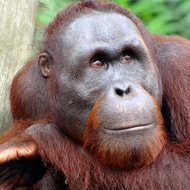
Rapid and severe progression raises concerns among scientists
The death of an orang-utan in Milwaukee Zoo could signal a new zoonotic parasite, scientists at the University of Wisconsin-Madison, have said.
Zoo keepers noted a loss of appetite in a juvenile Bornean orang-utan, named Mahal on December 29 2012. Two days later he was dead.
With an initial post mortem examination suggesting he died from acute respiratory disease due to a disseminated infection from an unknown parasite, scientists at the university set about using deep sequencing of total DNA.
Their conclusion was that Mahal's death may have been from a new parasite that may pose a risk to the heath of primates and other species.
"This animal's rapid and severe progression raises concerns about the health of captive apes in similar settings. Moreover, the close evolutionary relationship between orang-utans and humans raises concern about the parasite's zoonotic potential," said lead author Dr Tony Goldberg.
The report has been published online by the Centers for Disease Control and Prevention.
Image by Bjørn Christian Tørrissen



 The Veterinary Medicines Directorate (VMD) is inviting applications from veterinary students to attend a one-week extramural studies (EMS) placement in July 2026.
The Veterinary Medicines Directorate (VMD) is inviting applications from veterinary students to attend a one-week extramural studies (EMS) placement in July 2026.